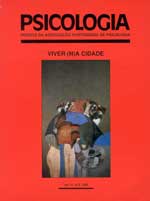Perspectivas epistemológicas em psicoterapia (II): Psicoterapia, dial´éctica e epistemologia, psicoterapia como processo estratégico de mudança cognitiva
DOI:
https://doi.org/10.17575/rpsicol.v6i3.814Keywords:
-Abstract
In this second half of the paper, the author describes and analysis the psychotherapeutic models of L. Joyce-Moniz and V. Guidano e G. Liotti ending with a clarification of the reasons that justify grouping them (together with Mahoney’s model, described in the first half of the paper) in the context of the relationships between philosophy of science and psychotherapy. Stressed as theoretical tenets of Joyce-Moniz’s model are: (a) a clinical practice based on »Piaget’s psychogenetic constructivism»; (b) the «dialectic relationship between the therapist’s and the client’s epistemologies» - intended to increase the «epistemic status» of the client and therapist; (c) «client’s socio-cognitive characteristics» - taking into consideration the socio-cognitive and structural levels reached by the client; (d) «structures and cognitive restructuring» - understood as dynamic systems of transformation to be activated toward adaptation; (...)


